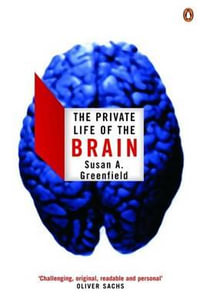
At a Glance
Paperback
RRP $24.99
$21.75
13%OFF
Aims to ship in 5 to 10 business days
When will this arrive by?
Enter delivery postcode to estimate
Emotion, says internationally acclaimed neuroscientist Susan Greenfield, is the building block of consciousness. As our minds develop we create a personalized inner world based on our experiences. But during periods of intense emotion, such as anger, fear or euphoria, we can literally lose our mind, returning to the mental state we experienced as infants.
Challenging many preconceived notions, Susan Greenfield's groundbreaking book seeks to answer one of science's most enduring mysteries: how our unique sense of self is created.
Industry Reviews
Consciousness has partly remained an elusive concept for so long because you almost feel you have to try and catch yourself out by lunging at it unexpectedly to finally capture it, but Greenfield amasses a huge array of fascinating data from all branches of contemporary science to provide a useful signpost on how to solve the problem. While she advances her own personal theories - that consciousness has something to do with the extensiveness of the associations in memory and experience that any sensation prompts - she does not try to ram her own ideas down your throat, but instead presents enough useful information to help you make your own mind up.
An unexpected bonus of the book is it devotes an extensive amount of analysis to the problem of pleasure, and comes up with some intriguing answers to why happiness will always be only temporary. However the book is a serious one, and in its quest for precision and accuracy does sacrifice some readability. It would not be suitable for anyone who was not already interested in the brain and had no prior background knowledge on the subject. But if you seriously want to understand yourself, or at least your brain, better, this is essential reading. Review by RAJ PERSAUD (Kirkus UK)
ISBN: 9780141007205
ISBN-10: 0141007206
Series: Penguin Press Science Ser.
Published: 12th May 2005
Format: Paperback
Language: English
Number of Pages: 272
Audience: General Adult
Publisher: Penguin UK
Country of Publication: GB
Edition Number: 1
Dimensions (cm): 1.7 x 13 x 19.8
Weight (kg): 0.2
Shipping
| Standard Shipping | Express Shipping | |
|---|---|---|
| Metro postcodes: | $9.99 | $14.95 |
| Regional postcodes: | $9.99 | $14.95 |
| Rural postcodes: | $9.99 | $14.95 |
How to return your order
At Booktopia, we offer hassle-free returns in accordance with our returns policy. If you wish to return an item, please get in touch with Booktopia Customer Care.
Additional postage charges may be applicable.
Defective items
If there is a problem with any of the items received for your order then the Booktopia Customer Care team is ready to assist you.
For more info please visit our Help Centre.




